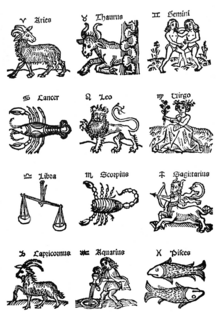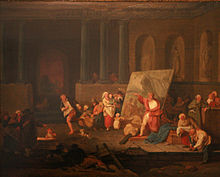List of Latin Phrases / S
Sacrificium
- Sacrificium intellectus
- "Sacrifice of the mind" - for believing against your better judgment
Sacrilegia
- Sacrilegia minuta puniuntur, magna in triumphis feruntur.
- “Small crimes are punished, great ones celebrated in triumph.” - Seneca , epistulae morales 87:23.
- This corresponds roughly to the saying “You hang the small ones, let the big ones run”.
Sacrum
- Sacrum Romanum Imperium
- “ Holy Roman Empire ” - Official name for the domain of the Roman-German emperors from the Middle Ages to 1806. Since the 15th century, the addition of the German nation (“Sacrum Romanum Imperium Nationis Germanicae”) gradually gained acceptance.
Saepe
- Saepe stilum vertas!
- “Turn the stylus often!” - Horace , Satires 1,10,72.
- Continuation (v. 72f): "iterum quae digna legi sint scripturus" - "to [ correct what is written on the wax tablet with the broad side of the pen ] to write again what should be worth reading".
- Saepe tacens vocem verbaque vultus habet.
- “Often a silent face has voice and words.” - Ovid , Ars amatoria , 1,574.
Sal
- Sal Atticus
- “Attic salt” - This means the witty, satirical joke that was typical of urban speech.
- The expression goes back to Cicero , de oratore ( About the speaker ) 2,217. There it says that the good speech should also be funny, but that this eludes the theoretical explanation; The masters of these “salsa” (salted jokes) were the Greeks and especially the inhabitants of Attica : “praeter ceteros Attici excellunt” ( the people in Attica excel here before all others ).
- Sal sapit omnia.
- " Salt spices everything."
Saltus
- Saltus in demonstrando
- "Leap in the evidence"
Salus
- Salus aegroti suprema lex (esto).
- "The salvation of the sick is the highest law!"
- Salus populi suprema lex (esto).
- “The good of the people is the highest law!” - Cicero de legibus 3,8. There it says about the consuls: “With royal power there should be two, […] they should have the supreme command and they should not be subordinate to anyone (literally: obey anyone). For them, the welfare of the people should be the supreme law. ”With this, Cicero declares the public welfare to be the state maxim.
- State motto of the US state of Missouri
- Salus publica suprema lex.
- “The public good is the highest law” - headline on the third leaflet of the White Rose resistance group .
- Salus ubi consilium
- "Heil, where advice (is)"
Salute
- Salutem et felicitatem!
- "Heil und Glück!"
Salva
- Salva venia
- "While maintaining your forbearance" - with all due respect. Ask for permission to use an otherwise offensive term.
- Another variant: Sit venia verbo .
- Salva veritate
- “Without prejudice to the truth” - Said about the correct exchange of one term for another.
volley
- Salvo pater patriae! Bibas, princeps optime!
- “Greetings, Father of the Fatherland! Drink, my best prince! ”- Greeting at the annual strong beer tapping on the Nockherberg . The first measure, which used to be available to the Elector, has been given to the Bavarian Prime Minister since 1965.
- Salve Regina
- "Greetings, Queen" - The Salve Regina is a Marian antiphon that begins with the words:
- "Salve, Regina, mater misericordiae"
- "Greetings, O Queen, Mother of Mercy."
Salvete
- Salvete, discipuli discipulaeque.
- “Greetings, students!” - Latin greeting at the beginning of the class
Salvo
- Salvo errore et omissione (seeo)
- "Subject to errors and omissions"
- Salvo (honoris) titulo (SHT)
- "The (honor) title unaffected" - If the title is left out in a cover letter because it is unknown.
Sancta
- Sancta sedes
- “The Holy See ” - The designation Holy See was previously given to other important bishoprics . In the course of secularization , however, this name was dropped. Exceptions are the Diocese of Rome and the Diocese of Mainz , which is called "Holy See (of Mainz)", Latin "Sancta sedes Moguntina, Roma specialis vera filia" .
- Sancta simplicitas
- “Holy simplicity!” - “O sancta simplicitas!” The reformer Jan Hus, who was sentenced to death at the stake, is said to have exclaimed in 1415 when he saw an overzealous woman bringing more wood.
- “Sancta simplicitas!” Also shouts Mephisto in Goethe's “ Faust ” when Faust says that one must first travel to Padua to get the death certificate for Marthe's husband.
Sanctificetur
- Sanctificetur nomen tuum.
- “Hallowed be your name.” - Request from the Our Father .
Sanctum
- Sanctum Officium
- "Holy Office" - The Congregation for the Doctrine of the Faith ("Congregatio pro doctrina fidei") was founded by Pope Paul III. founded with the constitution “Licet ab initio” of July 21, 1542 as “Congregatio Romanae et universalis Inquisitionis” (“Congregation of the Roman and General Inquisition ”) in order to protect the church from heresies , i.e. deviating beliefs.
Sanctus
- Sanctus, sanctus, sanctus Dominus Deus Sabaoth.
- "Holy, holy, holy God, Lord of all powers and powers." - Beginning of the Sanctus in the German Missal.
Sanguis
- Sanguis and Cinis
- "Blood and Ashes" - name of an Austrian band founded in 1994
- Sanguis et ignis
- "Blood and Fire" - motto on the flag of the Salvation Army (English: Blood & Fire )
Sapere
- Sapere aude
- “Dare to think!” - The quote comes from the letters of the poet Horace and reads:
- “Dimidium facti qui coepit habet: sapere aude.” - “Anyone who started has already acted halfway. Dare to think! "
This quote became known through the translation by Immanuel Kant in his essay answering the question: What is the Enlightenment of 1784 as the main idea of the Enlightenment . There it says:
- "Have the courage to use your own mind!"
Sapiens
- Sapiens omnia sua secum portat
- “The wise man carries all that is his.” - Cicero thus quotes the bias of Priene handed down by Terentius .
- See also Omnia mea mecum porto .
Sapienti
- Sapienti sat
- “Enough for someone smart” - Everything necessary has been said about something and there is no need to discuss it further.
- The sentence in Terence (Phormio 541) is completely: "Ah, dictum sapienti sat est" ("Ah, enough is said for a clever man").
Satanas
- Satanas miserere eorum !!
- "Satan, have mercy on her !!" - Quote from Else Lasker-Schüler's Chronica
Satura
- Satura tota nostra est.
- “The satire belongs entirely to us.” - The Romans attributed the satire to the mocking verses of the Roman poet Lucilius . Quintilian's proud sentence: "Satura quidem tota nostra est" ( "The satire is of course entirely ours" , Institutio Oratoria X, 1) shows how important this literary genre appeared to the Romans: this was the only one they had not adopted from the Greeks.
Saxa
- Saxa loquuntur.
- "The stones speak." - The geologists , palaeontologists and lithographers ' slogan , taken from the Gospel according to Luke, where Jesus says:
- "I tell you, if they are silent, the stones will scream!" ( Luke 19:40 EU )
Saxum
- Saxum Sisyphi volvere
- "Rolling the stone of Sisyphus" - quote from the works of the poet Terenz , where he describes how Sisyphus rolls the stone up the mountain.
- Saxum volutum non obducitur musco.
- “A stone that is rolled is not overgrown by moss.” - A sentence by the poet Publilius Syrus , on which the English proverb A rolling stone gathers no moss goes back.
Sciebam
- Sciebam me genuisse mortalem.
- “I knew that I had fathered a mortal.” - Reaction of the Greek philosopher Anaxagoras to the news of the death of his son.
Scientia
- Scientia potentia est.
- “ Knowledge is power. “- This catchy formula (English:“ Knowledge itself is power. ”) Comes from the writings of the English philosopher Francis Bacon . In the Latin original it says:
- "Ipsa scientia potestas est."
- Option / motto of the EW - Battalion 932 of the German Bundeswehr in Frankenberg (Eder) and for the purpose of dragnet decorated US Agency Information Awareness Office (IAO).
- Variant: "Scientia est potentia."
Scio
- Scio me nihil scire.
- “I know that I know nothing.” - Quotation of the Greek philosopher Socrates in his defense speech in court: Οἶδα οὐκ εἰδώς. ( Oida ouk eidōs. )
Scire
- Scire volunt omnes, mercedem solvere nemo.
- “Everyone wants to know, nobody pays fees.” - Quotation from the writings of the Roman poet Juvenal
Scribere
- Scribere qui nescit, nullum putat esse laborem.
- "If you don't know how to write, you don't think it's work."
- Quote from a Carolingian gospel book from the Essen Cathedral Treasury.
Scripta
- Scripta manent.
- "Only what is written is permanent."
Scuto
- Scuto bonae voluntatis tuae coronasti nos.
- "You have crowned us with the shield of your goodwill."
Sed
- Sed fugit interea, fugit irreparabile tempus.
- "But meanwhile flees, irretrievable time flees." - Virgil
- Sed omnes una manet nox.
- “But one night awaits everyone.” - Quote from the writings of the poet Horace , which alludes to death
- Sed omnia praeclara tam difficilia quam rara sunt.
- "But everything excellent is just as difficult as it is rare."
- Sed praefulgebant Cassius atque Brutus eo ipso, quod effigies eorum non videbantur.
- “But Cassius and Brutus shone precisely because their pictures could not be seen.” - From this point in the works of Tacitus about the Caesar murderers Cassius and Brutus, the phrase “shine through absence” is derived.
- Sed quis custodiet ipsos custodes?
- "But who will watch over the guards themselves?" - This sentence from Juvenal means something like: "Who controls the controllers?"
Sede / Sedes / Sedis

- Sede vacante
- “While the chair is vacant ” - Sedis vacancy is the period in which a bishopric in the Catholic Church is vacant .
- Sedes apostolica
- "The Apostolic See" - In its self-understanding, the Holy See refers to the Pope alone or together with the institutions of the Roman Curia, through which the leadership of the Roman Catholic Church is exercised.
- Sedis vacantia
- actually the vacancy of the seat - period in which an office, especially a bishopric , but especially the papal office in the Catholic Church, is not occupied.
Semel
- Semel catholicus, semper catholicus.
- "Once a Catholic, always a Catholic." - Principle in canon law
- Semel emissum volat inrevocabile verbum.
- "Once sent out, the word flies irrevocably." - Quote from the writings of the Roman poet Horace
- Semel maior, semper maior
- “Once grown up, always grown up” - See legal capacity in private international law .
- Semel pro semper
- "Once and for all"
- Semel scriptum, decies lectum
- "Written once (is as good as) read ten times"
Semper
- Semper aliquid addiscendum est.
- “There is always something to learn.” - loosely based on Cicero
- The saying could go back to two Cicero passages:
- Cato maior de senectute , 8 (26): ut et Solonem versibus gloriantem videmus, qui se cotidie aliquid addiscentem dicit senem fieri, et ego feci qui litteras Graecas senex didici - “As we also see in Solon, who boasts in verse, he grow old by learning something every day ; That's how I did it and learned Greek as an old man. "
- Laelius de amicitia , 104: Nam quid ego de studiis dicam cognoscendi semper aliquid atque discendi , in quibus remoti ab oculis populi omne otiosum tempus contrivimus - “Because what can I say about our efforts to always recognize or learn something with whom we are , away from the eyes of the crowd, spent all of our free time? "
- Semper aliquid hardens.
- “Something always gets stuck.” - Francis Bacon freely based on Plutarch . The quote reads in full:
- "Audacter calumniare, semper aliquid haeret." - "Just slander brazenly, something always sticks."
- Semper apertus
- “Always open” - the motto of Heidelberg University .
- The saying appears for the first time on both sides of an open book with a Palatinate lion rising to the left in its front paws against the background of old Heidelberg , in 1619 as Emblem No. 67 ( Insignia Academiae Palatinae ) in Emblematum ethico-politicorum centuria by Julius Wilhelm Zincgref . This copper engraving comes from Merian the Elder and is based on the old rectorate's seal of the university. There, however, the saying is missing in the book of the crowned lion, so that it is assumed that it comes from Merian or Zincgref.
- The always open book is the symbol of learning, thirst for knowledge and teaching.
- Semper Augustus
- “Always sublime” - In the Middle Ages, the mistranslation “always multiples of the empire” became part of the title of the Roman-German Kaiser . The mistranslation arose because Augustus was incorrectly translated as an active participle construct of augere and incorrectly as a passive one.
- Semper eadem
- “Always the same” - motto of Elizabeth I , Queen of England and Ireland from 1558 to 1603

- Semper fidelis
- “Always loyal” - the motto of some institutions, e. B. the US Marine Corps (mostly used there in the short form semper fi ) and some cities, such as Exeter and Lemberg
- Semper homo bonus tiro est.
- Literally: "A good person is always a beginner." - Martial Epigrams 12,51,2.
- The poem consists of two lines:
- “Why our Fabullianus is so often deceived, you wonder, Aulus? Semper homo bonus tiro est. "The answer to this question is probably best translated as:" A decent person always pays apprenticeship money. "
- Semper idem
- “Always the same.” - According to Cicero , Tusculanae disputationes 3,31, Xanthippe reported that the facial expression of her husband Socrates was “always the same” when they went out and when they came home. It also says:
- "Iure erat semper idem vultus, cum mentis, a qua is fingitur, nulla fieret mutatio." - "Rightly the expression was always the same, because the spirit through which it arises remained unchanged."
- Later the “semper idem”, which was detached from the sentence structure, was used to denote constancy.
- Semper in metu
- “Always in fear” - What is meant is the fear of God.
- Semper paratus
- "Always ready" - the motto of the US Coast Guard and the 2nd Squadron of the Air Force Object Protection Regiment (Bundeswehr, FRG)
- Semper talis
- “Always one” - “Always the same”; Motto of the guard battalion at the German Federal Ministry of Defense .
- Semper vigilans
- "Always vigilant" - the motto of the Navy secret service in the PC game and the book series Halo and the submarine USS Houston (SSN-713) of the US Navy and the Pentagon Force Protection Agency
Senatus
- Senatus Populusque Romanus ( SPQR )
- “The Senate and the People of Rome” - Official name of the Roman Republic. This refers to the patricians , to whom the Senate was originally reserved, and the plebs who make decisions in the popular assembly . This abbreviation was also on the standards of the Roman legions.
- The title Senatus Populusque Romanus is now held by the Comune di Roma ( City of Rome ).
Sensu
- Sensu auctorum (see auct.)
- "In the sense of the authors" - mainly used in biology (especially taxonomy )
- Sensu auctorum europaeorum (see auct. Europ.)
- "In the sense of European authors" - mainly used in biology (especially taxonomy )
- Sensu lato or Sensu latiore (s. Lat., S. L.)
- "In the broad sense" or "in the broader sense" - mainly used in biology (especially taxonomy )
- Sensu stricto or Sensu strictiore (s. Str., S. S.)
- "In the narrow sense" or "in the narrow sense" - mainly used in biology (especially taxonomy )
Sensus
- Common sensus
- "Common sense" - Healthy sense or sense of common good
Septem
- Septem artes liberales
-
Seven Liberal Arts - The Seven Liberal Arts are a canon of seven subjects that arose in antiquity and which, according to the Roman conception, represented "a free man" education. The liberal arts were named in order to evaluate them as being of higher priority than the practical arts ( Artes mechanicae ). A distinction was made between the liberal arts
- the trivium ( three-way ) of linguistic and logical-argumentative subjects
- and the advanced quadrivium ( four-way ) of the mathematical subjects.
Sera
- Sera parsimonia in fundo est.
- “At the bottom (meaning: the barrel), thrift comes too late.” - Quoted by the philosopher Seneca ( Epistulae 1,5) as an old Latin proverb in connection with the correct handling of life. In old age with his ailments, it is too late not to want to waste his life any more.
- Sera tamen tacitis Poena venit pedibus.
- "Late is still Poena (ie the criminal and goddess of vengeance..) Silent step." - A pentameter from Tibull 1,9,4.
Serius
- Serius aut citius sedem properamus in unam.
- “Later or sooner we rush to the same retreat.” - This means death. Ovid , Metamorphoses X, 33
Sermo
- Sermo datur cunctis, animi sapientia paucis.
- "Everyone has the language, only a few have a clever mind". - Dicta Catonis 1.10.
- This hexameter is preceded by the line “ Contra verbosos noli contendere verbis! "(" Don't go against the gossip with gossip! ")
Sero
- Sero molunt deorum molae.
- "The mills of the gods grind very late." - Corresponds to the German saying "God's mills grind slowly but surely."
- Sero sapiunt.
- “They come to their senses late.” - From a lost tragedy “Equus Troianus” - “The Trojan Horse” , which was quoted by Cicero ( Ad familiares 7,16.1) and alludes to the Trojans' late insight into giving Helena back.
- Sero te amavi.
- "I loved you later." - From the Confession of Augustine (0,27,38), in which he describes his conversion to the Christian faith with this sentence:
- "Sero te amavi, pulchritudo tam antiqua et tam nova, sero te amavi."
- "I loved you late, beauty, so old and yet so new, I loved you late."
- Sero venientibus ossa
- "Those who come (too) late (belong) to the bones." - Corresponds to the German saying "If you don't come at the right time, you have to see what is left."
- There is also a variant with tarde .
Serva
- Serva me, servabo te.
- "Save me, I'll save you!" - Corresponds to the German proverb One hand washes the other. Quoted from the Satyrica of the Roman writer Petron (44.3).
Hello
- Servus servorum Dei
- “Servant of the Servants of God” - A title of the Pope
Sesquipedalia
- Sesquipedalia verba
- “Words and a Half Foot Long” - Long and complicated words used without need. Expression from the Ars poetica of the poet Horace
Si
- Si alteram talem victoriam reportavero, mea erit pernicies.
- “If I still achieve such a victory, it will be my downfall.” - Resigned statement by King Pyrrhus after the Battle of Asculum, his so-called Pyrrhic victory , quoted by Plutarch .
- Si charter cadit, tota scientia vadit.
- "If the sheet falls down, all science is gone." - Maccharonic verse to caricature a lecturer who can only be read from his manuscript.
- Si comprehendis, non est Deus.
- "If you understand it, it is not God." - Augustine of Hippo ; compare negative theology .
- Si Deus nobiscum quis contra nos?
- "If God (is) with us, who (then) against us?" - "If God is on our side, who can do something against us?" The motto of the Kingdom of Poland-Lithuania and the motto of the Grand Ducal Hessian Order of Merit .
- The sentence comes, slightly modified, from Paul's letter to Romans 8:31, where the translation of the Vulgate says: “Si Deus pro nobis, quis contra nos?” - “Is God for us, who is against us? ”(8.31 EU ).
- Si felicitas esset in delectationibus corporis, boves felices diceremus, cum inveniant orobum ad comedendum.
- “If happiness consisted in the pleasures of the body, we would praise oxen happy when they found a pea to eat.” - Albertus Magnus , De Veget.
- Si Filius Dei es, descende de cruce.
- "If you are the Son of God, then descend from the cross!" - Invitation to the crucified Jesus according to the Gospel according to Matthew (27.40)
- Si fueris Romae, Romano vivito more!
- “When you are in Rome, live the Roman way!” - Augustine quotes this sentence from Ambrose of Milan as an answer to the question of the right behavior. The quote, a distich , reads completely:
- Si fueris Romae, Romano vivito more!
Si fueris alibi, vivito sicut ibi! - “When you are in Rome, live the Roman way!
If you are elsewhere, live like (the others) there! " - The sentence that has become a proverb is usually used somewhat modified:
- "Si vivis Romae, Romano vivito more!"
- Si libet, licet.
- "If you like it, it's allowed."
- Si monumentum requiris, circumspice
- “If you are looking for a monument, look around.” - Album by the black metal band Deathspell Omega , spelling “ Si monvmentvm reqvires, circvmspice ”.
- Si mortem contemnis, timorem vincis.
- "If you despise death, you conquer fear."
- Si parva licet componere magnis
- “If one can compare the small with the big” - Virgil, Georgica 4,176.
- Si quaeris peninsulam amoenam, circumspice.
- "If you are looking for a lovely peninsula, look around you." - Motto of the US state Michigan : The entire state is located on two peninsulas on the Great Lakes .
- Si quis dat mannos, ne quaere in dentibus annos.
- "When someone gives ponies, don't look for the years in their teeth!" - Compare the German proverb, which is also rhyming, "You don't look a given horse in the mouth."
- Si tacent, satis dicunt.
- “If you are silent, say enough.” - Cicero
- Si tacuisses, philosophus mansisses.
- “If you had remained silent, you would have remained a philosopher.” - A motto freely adapted from Boethius , in whose consolation philosophy (2, 7, 20 f) someone answered the question of a would-be philosopher Intellegis me esse philosophum? - "Do you now recognize that I am a philosopher?" Replies:
- Intellexeram, si tacuisses - "I would have known if you had been silent".
- Occasionally the quote is misrepresented as si tacuisses, philosophus fuisses - “if you had kept silent, you would have been a philosopher”. In this form the quote is already contained in the Adagia of Erasmus of Rotterdam .
- Si valeant homines, ars tua, Phoebe, vacet.
- “When people are healthy, rest your art, Phoebus.” - Ovid , Tristia 4,3,78.
- Phoebus is a nickname for Apollo , the god of healing.
- Si vales bene est, ego quidem valeo.
- "If you are well, it is fine, I am in any case fine." - Formula at the end of letters, usually abbreviated as SVBEEQV
- Si vir es, i!
- "If you are a man, go!"
- Si vis amari, ama!
- “If you want to be loved, love!” - proverb. Seneca ascribes this sentence to the stoic philosopher Hekaton : "Hecaton ait, 'ego tibi monstrabo amatorium sine medicamento, sine herba, sine ullius veneficae carmine: si vis amari, ama'." - "Hekaton says: I will give you a drug without medicine show, without medicinal herbs and without magic: If you want to be loved, love! ”(Seneca, Epist. 9,6.)
- Si vis pacem para bellum .
- "If you want peace, prepare for war." - The brand name Parabellum , which was used for small arms, is derived from this maxim . In the English-speaking area there is the Colt Peacemaker .
- Another variant of the saying is "Si vis pacem, para iustitiam" - "If you want peace, ensure justice".
- Si vivis Romae, Romano vivito more.
- "If you live in Rome, you should live the Roman way." - Frequent modification of Si fueris Romae, Romano vivito more!
Sic
- Sic
- "So", "literally so" - in brackets - ie "(sic)" or "[sic]", also with an exclamation mark - indicates that the preceding quote is reproduced exactly as in the source, usually despite errors in Spelling, grammar, language usage or content.
- Sic et non
- "So and not (so)" - "Yes and no". Scholastic method developed by Abelard , in which opposing opinions of authorities were compared with one another before answering a question.
- Sic itur ad astra.
- “This is how you get to the stars.” - This is how you get fame. Virgil , Aeneid 9, 641
- Sic luceat lux.
- “This is how (your) light should shine!” - Quotation from the Gospel according to Matthew ( Mt 5,16 VUL ): sic luceat lux vestra coram hominibus ut videant vestra bona opera et glorious Patrem vestrum qui in caelis est
- Sic passim
- "So in different places" - with references; see Passim
- Sic semper tyrannis
- “This is how it should always go to the tyrants” - motto of the US state Virginia ; later words of Lincoln assassin John W. Booth , originally attributed to Brutus .
- Sic transit gloria mundi
- "This is how the glory of the world passes" - When a Roman general marched in triumph, a slave had to step before him, burn a flake of wool and shout this saying. The custom was adopted for the solemn entry of a newly elected Pope.
- Sic vos non vobis
- "You, but not for you" - The dictum with the accompanying anecdote is passed down in the Vita Vergilii ( Life of Virgil ) by Aelius Donatus : It is about verses of Virgil , who in the night a poem of praise to the residence of the emperor Augustus wrote, for which the would-be poet Bathyllus pretended to be the author and received the reward. Virgil then wrote: “Hos ego versiculos feci, tulit alter honores” ( “I wrote these verses, the honors earned the other” ) and four times the words “Sic vos non vobis” . Since no one else saw himself able to do so, he added them to the following verses himself:
Sic vos non vobis aedificatis aves,
Sic vos non vobis vellera fertis oves,
Sic vos non vobis mellificatis apes,
Sic vos non vobis fertis aratra boves.
That's how you build nests, birds, not for yourself, that's
how you carry wool, sheep, not for yourself, that's
how you make honey, you bees, not for yourself, that's
how you pull plows, cattle, not for yourself.
Signet
- Signature (sig)
- “Should be designated” - Note on a doctor's prescription
Silent
- Silent legs inter arma.
- "The laws are silent under arms."
- From Cicero's speech for Milo (10 per Milone). See Inter arma enim silent leges .
Silere
- Silere non possum!
- "I cannot be silent!" - or: "I cannot remain silent!"
- Sentence of Pope Emeritus Benedict XVI. on the debate about the abolition of celibacy as a reason for relinquishing reluctance, became known in early January 2020
Simile
- Simile gaudet simili.
- "Similar is happy about similar." - "Equal and equal like to join."
- Compare also in Greek Ἀεὶ κολοιὸς παρὰ κολοιῷ ἱζάνει. - "With a jackdaw there is always a jackdaw."
Similia
- Similia similibus curantur.
- “Similar things are cured by similar things.” - Paracelsus
- Similia similibus curentur.
- "Similar things are cured by similar things." - Principle of the American Institute of Homeopathy since 1899 and later of homeopathy worldwide. Hahnemann himself, according to his own statements, did not orientate himself on Paracelsus ("Similia similibus curantur").
- Similia similibus solvuntur.
- “Similar dissolves in similar.” - The sentence comes from medieval alchemy, from which today's chemistry arose. There it is still valid today, compare hydrophilicity and lipophilicity .
simplex
- Simplex sigillum veri.
- “The simple is the seal of the true” or “Simplicity is the seal of the truth.” - the motto of the botanist and physician Herman Boerhaave , to whom the sentence is sometimes ascribed.
Sine
- Sine anno (see a.)
- “Without year” - Used in bibliographies to indicate that the year of publication is not given.
- Sine correctione (s. C.)
- “Without correction” - used in ophthalmology when visual acuity is checked without optical correction such as glasses or contact lenses.
- Sine the
- "Without (set) day"
- Sine dominico non possumus
- “We cannot (live) without (this) cause of the Lord.” - The quotation is used in the ecclesiastical field to emphasize the importance of Sunday sanctification , worship and the Eucharist . During his interrogation by the Roman governor, emeritus, one of the martyrs of the holy books , referred to the necessity of the Lord's Supper, which he himself, like many other Christians, had celebrated despite the imperial prohibition, for which he and his were Companions but had decided despite threats of torture and death sentence.
- Sine ira et studio
- “Without anger and zeal” - ie. impartial. Tacitus announced such a representation at the beginning of his annals .
- Sine loco (see left)
- “Without place” - Used in bibliographical references and indicates that the place of publication is not given.
- Sine loco et anno (slea)
- "Without place and year" - Is used in bibliographical information and indicates that neither place nor year of publication are given.
- Sine nobilitate (s. Nob)
- "Without nobility" - In British student lists, reference to the non-aristocratic origin of a student. The abbreviation is considered to be one of the explanations for the origin of the word snob .
- Sine nomine (s. N.)
- “Untitled” - Used in bibliographical references to indicate that the publisher is unknown.
- Sine qua non
- “Not without them” - see under Condicio sine qua non .
- Sine tempore (st)
- “Without time” - lectures begin at the specified time, that is, without delay by the academic quarter of an hour .
Sint
- Sint Maecenates, non deerunt, Flacce, Marones.
- “If there are only maecenates, Flaccus, then there will be no shortage of chestnuts. ” - Martial , epigrams 8,56,5.
- Sinn: "If there are patrons , there are also artists."
- Gaius Maecenas was an advisor to the Roman Emperor Augustus and a patron of the arts, whose name as "patron" became a generic term. Maro is the nickname of the poet Virgil . Flaccus is the addressee, the addressee of this poem, but also the epithet of Horace . Sometimes quoted with Nasone 's reading as the last word (after Ovid's epithet ).
Siste
- Siste, viator!
- “Stand still, wanderer!” - The beginning of inscriptions on gravestones, popular since antiquity, in which the passer-by - often the deceased himself - is asked to stop and read on or to think about transience.
- This sentence, metrically part of a hexameter, is often the beginning of a grave epigram in verse form ( hexameter or distich ).
Sit
- Sit brevis aut nullus tibi somnus meridianus.
- "Your afternoon nap is short or not at all." - From the Regimen sanitatis Salernitanum ( Instructions from Salerno on health , a compilation of health rules from the school in Salerno in hexameters ), No. 3 ("de somno meridiano" / "Vom Mittagsschlaf" ).
- Sit levis terra
- "May the earth be light." - Request for obituaries and obituaries
- See also Sit tibi terra levis below .
- Sit nomen Domini benedictum ex hoc nunc et usque in saeculum.
- The name of the Lord be praised from now to forever. - Ps 113.2 EU in the Vulgate Translation, in the Roman Catholic liturgy of the beginning of the ceremony, the bishop or pope donated apostolic blessing .
- Sit nomine digna
- “May it prove worthy of its name” - Rhodesia's motto
- Sit piger ad poenas princeps, ad premia velox.
- “Let the regent be slow with the punishments, be quick with the rewards.” - Quotation from the works of the poet Ovid (letters from exile 1,2,121).
- Sit tibi terra levis (sttl)
- "May the earth be easy for you." - Roman blessing for the dead, handed down in this form through Martial . In a different formulation in Tibullus and Ovid. The image was used in Greek before
- The opposite sentence "sit tibi terra gravis urgeat ossa lapis" (be the earth heavy for you, the stone press your bones) is used as a curse against enemies. It is a modified quote from a poem by Tibullus. Correspondingly also with Seneca : "istam terra defossam premat, gravisque tellus impio capiti incubet" (May the earth press this buried person // and lie heavily on the godless head).
- Sit venia verbo
- "The expression is excused." "With all due respect" ; other variant: Salva venia .
- Sit vera et sincera amicitia.
- “It is a true and sincere friendship.” - the motto of the Peace of Westphalia , with which the Thirty Years War ended.
Sociale
- Social animal
- "Social animal" - Zoon politikon is a determination of the essence of humans going back to the philosopher Aristotle . It says that the human being is a social, state community based and educating living being - u. a .; because one must not overlook the fact that Aristotle considerably relativizes this statement in the Nicomachean Ethics (1162 a): Humans are "due to their nature more of a zoon syndyastikon (a living being intended for a community of two) than a zoon politikon" .
Societas
- Societas Jesu (SJ)
- “Society of Jesus” - The Society of Jesus is a Catholic religious order whose members are called Jesuits . The term “Jesuit” was initially used as a mock name, but was later adopted by the order itself.
- Societas leonina
- "Lion Society" - A Leoninian contract is a partnership agreement , according to which all partners bear the risk, but only one partner receives the profit. The term refers to a fable of Aesop , in which all animals must take part in the hunt, but the lion ( Latin Leo ) kept all the prey to himself.
- Societas Missionariorum Africae
- "Society of Africa Missionaries" - White Fathers (Latin: Patres Albi PA, French: Pères Blancs) - actually Society of Missionaries of Africa - is the name of a Roman Catholic religious community that was founded in 1868 by the Archbishop of Algiers for the Africa mission .
- Societas perfecta
- "Perfect fellowship" - In political philosophy, Catholic ecclesiology and Catholic canon law, a self-sufficient or independent community in the sense that it possesses all the means and conditions necessary for the realization of its (comprehensive) goal and is not subject to any superordinate community.
- Societas Verbi Divini
- "Society of the Divine Word" - The Steyler Missionaries are a Roman Catholic religious order, named after the small town that was founded in Steyl , today a district of Venlo (Steijl district) in the Netherlands.
Sol

- Sol Invictus
- "The undefeated sun god" - Sol is the ancient Roman sun god. Emperor Aurelian defeated the army of the Palmyrenean ruler Zenobia in 272 and then went to the Elagabal temple to thank the god for help in the battle. Two years later he built a temple to Sol Invictus in Rome, made him the patron of the entire empire and established a state cult for him.
- Sol iustitiae illustra nos.
- “Sun of Justice, enlighten us!” - Utrecht University's motto
- Sol lucet omnibus.
- "The sun shines for everyone." - Originally by Titus Petronius Arbiter from the " Satyricon " (Chapter 100)
- Sol omnia lucet.
- "The sun shines on everything."
- Sol omnia regit.
- “The sun rules everything.” - Inscription on the museum of the Polish city of Frombork (Frauenburg), the place where Nicolaus Copernicus worked .
- Sol testis meus.
- "The sun is my witness." - The coat of arms of the Canadian city of Aurora
Sola
- Sola bona quae honesta
- "Only good (is) what is honorable" - excerpt from Tacitus, Hist. 4,5, where the stoic canon of values is reported: only what is honorable is good, only shamefulness is bad; on the other hand, power, nobility and other external dimensions are indifferent. - Motto of the Elector Ernst-August von Braunschweig-Lüneburg (1629–1698).
- Sola fide
- “By faith alone” - the term is a principle of the Reformation in Christianity. It expresses the idea that a person cannot earn the recognition of God through works, but receives it solely through his faith relationship with God, which proceeds only from God.
- Sola gratia
- “By grace alone” - the term expresses the idea that a person cannot expect God's grace through his actions. The most important biblical basis for this thought is Romans 3:21–28 LUT.
- Sola scriptura
- “Through (Holy) Scripture alone” - According to this principle, the Bible is the sufficient mediator of salvation and does not need to be supplemented by church traditions. The phrase "sola scriptura" goes back to Martin Luther's formulation that scripture alone is queen, which he in his justification Assertio ( "Freedom Declaration") of 1520 against those of Leo X issued Papal Bull of Excommunication used.
Solos
- Soli deodorant.
- (“Only for) God alone.” - Also written together another expression for the pileolus , a headgear that originally covered the tonsure of high clergy and which is only removed at the Eucharist as a sign of reverence for God.

- Solos Deo Gloria .
- “God alone be glory!” - Sign at the beginning or at the end of some artistic works of the Middle Ages and the Baroque, also as an abbreviation SDG The author makes it so clear that he understands his work as praise of God. Composers such as Johann Sebastian Bach and Georg Friedrich Handel signed most of their works with this signature. Often even instead of your own name.
- Soli homini datum est loqui, cum solum sibi necessarium fuerit.
- “Only man was given to speak because only he needed it.” - Dante Alighieri , de vulgari eloquentia 1,2,1.
- This passage reads completely as follows: “Eorum que [ sic !] Sunt omnium soli homini datum est loqui, cum solum sibi necessarium fuerit. Non angelis, non inferioribus animalibus necessarium fuit loqui "(" Of all existing <living beings> only humans were given to speak because only they needed it. Language was not necessary for angels and not for lower-ranking living beings ").
Solitudinem
- Solitudinem quaerat, qui vult cum innocentibus vivere.
- "Those who want to live with the innocent must seek solitude." - Publilius Syrus
Solus
- Solus Christ
- "Christ alone" - In Lutheran theology, this term means that Christ alone, with his work of salvation, brings about the redemption of sinful people.
Somnus
- Somnus est imago mortis.
- “Sleep is an image of death.” - Quoted from Ciceros Tusculanae disputationes (1, 38).
Spectatum
- Spectatum veniunt, veniunt, spectentur ut ipsae.
- “They come to see, they come to be seen themselves.” - In his Ars amatoria , Ovid advises that you can make good friends in the theater, because women don't just come to see the play, they come also to be seen for yourself.
spirit
- Spirit rector
- “Spirit as leader” - This phraseologism describes a person who is spiritually guided by a community.
- In alchemy , spiritus rector was a name for the spiritual principle that holds all things together.
- Spiritus spirat, ubi vult.
- "The mind breathes where it wants."
Splendid
- Splendide mendax
- "Admirably hypocritical / lying" - Horace , Carmen 3,11,35.
- Horace praises Hypermestra , the only one of the fifty daughters of Danaus who, contrary to the father's command, did not stab her husband on their wedding night:
Una de multis face nuptiali
digna periurum fuit in parentem
splendide mendax et in omne virgo
nobilis aevom
One girl of the many,
worthy of the wedding torchlight procession, was admirably hypocritical of
her perjured father and remains
famous for all eternity.
- Jonathan Swift used the term as a pseudonym in his satirical novel Gulliver's Travels .
Splendor

- Splendor sine occasu
- “Splendor without restriction” - the motto of the Canadian province of British Columbia , which alludes to the coast to the Pacific , the peaks of the Rocky Mountains and the lush forests of the province.
Sta
- Sta, viator.
- “Stand still, wanderer!” - In Gustave Flaubert's novel Madame Bovary , this phrase occurs in the epitaph for Emma Bovary:
- “Sta viator! amabilem coniugem calcas! ”-“ Stop a wanderer! You appear in front of a lovable wife. "
- In the novel it says:
- “Homais found nothing more beautiful as an inscription than: Sta viator! He kept suggesting these words. He was really mad about her. He kept whispering to himself: "Sta viator!" At last he came up: Amabilem coniugem calcas! That was accepted. "
Stabat
- Stabat mater .
- "The mother stood." - The "Stabat mater" (after the beginning of the poem: "Stabat mater dolorosa" - "The mother stood in pain") is a medieval poem that the painful Maria (here Mater Dolorosa ) in her pain for the Sings about crucified Jesus . It starts with the following stanza:
Stabat mater dolorosa
Juxta crucem lacrimosa,
Dum pendebat filius.
Cujus animam gementem
Contristatam et dolentem
Pertransivit gladius.
Stante
- Stante pede
- "Standing foot" - that is, without losing time by leaving. Educational language: immediately, without hesitation .
- The phrase is not classical Latin. The German transmission hardly took place before the 18th century .
Stat

- Stat crux, dum volvitur orbis .
- "The cross is fixed, while the world turns" - motto of the Carthusian -Ordens, a semi- hermit - Order that the Saint Bruno of Cologne back.
- Stat magni nominis umbra.
- “He stands there as the shadow of a great name.” - Quotation from the Pharsalia of the Roman poet Marcus Annaeus Lucanus
- Stat pro ratione numerus.
- "Instead of reason there is number." - dictum of the Prussian Chancellor Otto von Bismarck , with whom he criticized the majority principle in democratic decisions. For the origin of the saying see “ Stat pro ratione voluntas ”!
- Stat pro ratione voluntas.
- “Instead of justification, there is the will.” - Juvenal . It is about a woman who wants the death of a slave for trivial reasons and says domineeringly:
- “Oh you fool, is the slave human? He may not have done anything, so be it: This is what I want, I command it, instead of a reason, my will applies. "
- Stat sua cuique dies .
- "Everyone has their day." - Quote from the Aeneid of the Roman poet Virgil (Book 10, 467):
- “But then the father said to the son with friendly words: 'Everyone has his day; is short and irretrievable all of life's time: but radiate fame and drive, that is man's work ... '"
- The term day stands here euphemistically for the day of death.
State
- State in Fide.
- “Stand firm in your faith!” - Cardinal Karl Lehmann's motto (compare 1st letter of Paul to the Corinthians , 16.13 EU ).
Statim
- Statim (stat)
- "Immediately" - note on medical orders
status
- Status quo ( ante )
- "The state in which (something is / was before)" - namely at a certain point in time or before a certain event
Stella
- Stella clavisque Maris Indici
- "Star and Key of the Indian Ocean" - motto of the island of Mauritius , in the southwest of the Indian Ocean is
- Stella Maris
- "Star of the Sea" / "Sea Star" - a decorative epithet for Mary , the mother of Jesus . Under this name she is the patron saint of seafarers and symbolizes the saving star that shows the direction.
Always
- Always
- "Should stay." - Correction note, which states that something previously deleted or marked for deletion should be retained.
Education
- Study quid inutile temptas?
- “What kind of useless stuff do you deal with?” - Ovid's father accuses his son of this ( Tristia ) 4,10,21, because he prefers to write poetry instead of learning to be a speaker; not even Homer left riches (v. 22: “Maeonides nullas ipse reliquit opes”).
- See also: Quod temptabam scribere, versus erat.
Stulti
- Stulti est se ipsum sapientem putare.
- “It is stupid to think of yourself as wise.” - Proverb
Stultorum
- Stultorum infinitus est numerus.
- "The number of insane is limitless."
- Stultorum plena sunt omnia.
- “The world is a madhouse” - Cicero
- Stultorum regum et populorum aestus
- "Heat of foolish kings and peoples" - According to Horace, the Iliad describes the outbursts of anger of stupid kings and peoples.
Stultum
- Stultum facit Fortuna, quem vult perdere.
- "Fate strikes with stupidity those whom it wants to destroy."
Stultus
- Stultus est.
- “He's stupid.” - In Philae , an island in the Egyptian Nile Valley flooded by the Aswan Dam , there is the graffito “B Mure Stultus Est.” - “B Mure is stupid.” It is probably a soldier from Napoleon Army or an English traveler later.
stupor
- Stupor mundi
- “The amazement of the world” - name by which Frederick II was known. He is generally regarded as a “miracle being” among the German rulers of the Middle Ages.
Sua
- Sua sponte
- "On my own initiative" - From the legal language; also motto of the US Army Rangers
Suae
- Suae quisque fortunae faber est.
- “Everyone is the maker of their own happiness.” - A sentence from Appius Claudius Caecus , which is passed down as a quotation in indirect speech through Sallust (letters to Caesar 1,2): “… quod in carminibus Appius ait fabrum esse suae quemque fortunae” ( "What Appius says in his poems that blacksmith is everyone of his own fortune / fate").
Suave
-
Suave, mari magno turbantibus aequora ventis,
e terra magnum alterius spectare laborem. - "It is pleasant with the high seas and the sea churning winds,
from the land, to watch someone else's great effort." - Quoting from the works of the Roman poet Lucretius , which reads completely as follows:
Suave mari magno turbantibus aequora ventis
e terra magnum alterius spectare laborem,
non quia vexari quemquam est iucunda voluptas,
sed quibus ipse malis careas quia cernere suave est
It's wonderful in a surging sea when the storm
churns up the waters , to see calmly from the land, how another is struggling,
not that we are happy when someone endures suffering,
but out of joy that one is freed from suffering oneself.
- This quote corresponds to a passage from Goethe's drama Faust I in which a philistine says:
I don't know anything better on Sundays and public holidays
than a conversation of war and war cries,
When back, far, in Turkey,
the peoples beat each other.
Suavis / Suaviter
- Suavis laborum est praeteritorum memoria.
- "The memory of past efforts is pleasant."
- Suaviter in modo, fortiter in right
- "Moderate in nature, tough in business" - the Jesuit motto , which comes from Claudio Acquaviva , the fifth general of the Societas Jesu .
Sub
- Sub conditione Jacobea
- "Under the Jacobean reservation" - see under Condicio Iacobea ("God willing and we are alive.")
- Sub cruce lumen
- "Light under the Cross" - motto of the Australian University of Adelaide , which probably refers to the Southern Cross .
- Sub iudice
- “At the judge's” - A legal case that has not yet been decided and cannot yet be discussed publicly.
- Sub limit (sl)
- "Below the limit" - A correction note that states that an exam clearly misses the requirements, so that there is no need to calculate the points.
- Sub omni canone
- “Under every guideline” Also known as “Sub omnibus canonibus”. The phrase has nothing to do with cannons, but with the canon , but “Under all cannon” is derived from it.
- Sub pink
- “Under the rose” - the rose as a sign of secrecy goes back to the observation that the ' queen of flowers ' must not let us forget what the saying goes: “No roses without thorns” . The Romans hung a rose on the ceiling during secret meetings so that those present would remain silent about what was said.
- Sub poena (subpoena)
- “Under penalty” - A request with a criminal offense, subpoena
- Sub sigillo confessionis
- "Under the confessional seal" - while maintaining the confessional secret
- Sub solis luce miserrimum esse quam umbrarum princeps esse malle.
- "Better to be the poorest under the sunlight than the prince of shadows." - A significant statement about the Greek conception of the afterlife
- Sub specie aeternitatis
- “From the perspective of eternity” - quote from Spinoza's ethics
- Sub umbra floreo.
- “I bloom in the shade.” - Motto of the Central American state of Belize
Succisa
- Succisa virescit.
- "Though blown away, it sprouts again." - Coat of arms of the Monte Cassino monastery , the mother monastery of the Benedictine order
Sudetia
Sui
- Sui generis
- "Own genre" - unique
- Sui iuris
- "Own rights" - Frei sui iuris from the patria potestas, in Roman law sons and daughters only became through the death of the pater familias, less often through the later, more frequent emancipatio, the pseudo sale by the pater familias to third parties, who then pronounced the release .
- “ Mission sui juris ” (“Mission in its own right”): a territorial organizational unit directly subordinate to the Pope in Roman Catholic mission areas
Sum
- Sum quod eram, nec eram quod sum; nunc dicor utrumque
- “I am what I was but wasn't what I am; now my name is both ”- medieval theological riddle
- Sum quod eris / Fui quod es (sis)
- “I am what you will be / I was what you are” - inscription on a tombstone reminding the reader of the inevitability of death. See also Tu fui, ego eris.
Summa
- Summa cum laude
- "With the highest praise" - the best possible grade for a doctoral thesis: "excellent", "excellent"
- "Summa cum laude" (with the highest praise)
- "Magna cum laude" (with great praise)
- "Cum laude" (with praise)
- "Rite" (sufficient)
- "Insufficienter" (insufficient)
- Name of an international youth music festival in Vienna
- Summa potestas
- “Supreme power” - sovereignty
- All in all
- “Sum of all sums” - The main result, the result of all of the above; mostly used in the sense of total, all in all .
- The expression occurs in several Latin authors; z. B. in Plautus , Truculentus (= curmudgeon, ruffian) 25; Seneca , epistulae morales 40:14 and Lucretius .
- Summa Summarum is also the title of a poem by Theodor Fontane with the subtitle All in all .
Summum
- Summum bonum
- “The highest good” - The philosopher Aristotle speaks of the highest good as a principle according to which the norms of human action are to be justified. (Also Finis bonorum ; Greek mostly identical with to agathon )
- Summum ius summa iniuria.
- “The highest right is the highest injustice.” - Cicero , De officiis 1,33. In this context, Cicero explains that a malicious and subtle interpretation that only adheres to the letter of the law, not the meaning and intention, can turn right into wrong. He describes the sentence as an old proverb and indirectly quotes the comedy Heauton timoroumenos of Terence , where (verse 796) it says “ius summum saepe summast malitia” (“The peak of law is often the peak of malice”).
- Summum malum
- “The greatest evil.” - According to Thomas Hobbes , the goal of the state is not to achieve a summum bonum ( achievement of the best ), but only to avoid the summum malum ( averting the worst ).
Sunt

-
Sunt Aries, Taurus, Gemini, Cancer, Leo, Virgo,
Libraque, Scorpius, Arcitenens, Caper, Amphora, Pisces. - (The signs of the zodiac) "are Aries, Taurus, Gemini, Cancer, Leo, Virgo, Libra, Scorpio, Sagittarius, Capricorn, Aquarius and Pisces." - Medieval pair of memories ( hexameters ) for the twelve signs of the zodiac , starting with spring.
- Sunt lacrimae rerum et mentem mortalia tangunt.
- “One has tears for what happened, and human fate touches our heart.” - Virgil , Aeneid 1,462
- Sunt omnes unum.
- “They are all one.” - Quote from Virgil's Aeneid
- Sunt pueri pueri, pueri puerilia tractant.
- "Boys are boys, and boys do boyish things." Or "Children are (stop) children, and children make childishness." - This hexameter verse refers to stupid things.

- Sunt rupes virtutis iter.
- "Rocks are the path of virtue." - Something like : "The path of virtue is rocky." The motto of the central French town of Tulle , which was mainly adopted by mountaineers and mountain hunters, who interpret virtus in the narrower sense as bravery.
Suo
- Suo iure
- "In its own right" - title of nobility in its own right
- Suo motu
- "Of their own accord"
Suos
- Suos cultores scientia coronat.
- “Science crowns those who care for it.” - Motto of Syracuse University in the US state of New York
Superbia
- Superbia in proelia
- "Proud in battle" - the motto of the English football club Manchester City
Superbient
- Superbientem animus prosternet.
- “The arrogant will be brought down by his arrogance” - Book of Proverbs 16:18.
- The sentence corresponds to the German saying “ Arrogance comes before the fall. "
Surdo
- Surdo non binas tu missas nec cane trinas.
- “Don't sing mass two or three times for a pigeon!” - Medieval proverb in the form of a hexameter. For example: "Do not preach to deaf ears in vain!"
Sursum
- Sursum corda.
- “Lift up your hearts!” - Lift up your hearts! From the preface of the catholic mass .
Sustine
- Sustine et abstine.
- “Endure and renounce!” - the motto of the Greek philosopher Epictetus
Sutor

- Sutor, ne ultra crepidam.
- “Shoemaker, stick to your last!” - The painter Apelles is said to have set up his paintings in such a way that he could hear the observers' comments. A shoemaker complained about the lack of an eyelet on a painted shoe, whereupon Apelles added it. Thereupon the shoemaker also criticized the leg, which Apelles acknowledged with this exclamation.
- Also called “ Ne sutor ultra crepidam. “Handed down.
Suum
- Suum cuique
- “To each his own” - “Suum cuique” was the motto of the Order of the Black Eagle , which Frederick II of Prussia as king always wore in his uniform. Today, this is the motto of the Military Police of the Armed Forces .
- Suum cuique tribue.
- "Grant everyone their own!"
Sybaritica
- Sybaritica calamitas
- “ Sybaritic calamity ” - people who perish because of moral corruption
- Sybaritica mensa
- “ Sybaritic table.” - Sumptuous meal. Also a Syracuse table ( Syracusana mensa ), because the Syracusans also used to live splendidly.
Individual evidence
- ^ Dictionary of idioms, origin and meaning, Duden, 2nd revised and supplemented edition, p. 172
- ↑ Romans 8:31 (Vulgate). In: bibelwissenschaft.de, accessed on July 20, 2019.
- ↑ Epistula 54,2,3 = Migne PL 33,201
- ^ Cicero, Divinatio in Caecilium 21
- ↑ See also translation by Niklas Holzberg Tusculum 2015 books.google
- ^ Catholic Church: Ex-Pope Benedict irritates with celibacy plea. In: Stern.de . January 13, 2020, accessed on January 18, 2020 ( DPA notification).
- ^ William Makepeace Thackeray: Book of Snobs . Punch Office, London, 1868. ( Online in Google Book Search)
- ↑ "sit tibi terra levis mollique tegaris harena" (May the earth be light for you and you covered with soft sand.) - Martial; Epigrams 9, 29, 11
- ↑ "terra sit super ossa levis" (May the earth be light over your bones for you.) - Tibullus, Elegies 2,4,50
- ↑ “sit humus cineri non onerosa tuo” (May the earth of your ashes not be burdensome.) - Ovid; Amores 3,9,68; "Molliter ossa cubent" (May the bones lie softly) - Ovid; Tristia 3,3,74
- ↑ " κούφα σοι // χθὼν ἐπάνωθε πέσοι " (Light be the weight of the earth above you.) - Euripides; Alcestis 463f. From an unknown author: " κούφη γῆ τοῦτον καλύπτοι " (The earth be light for him.)
- ↑ Tibullus, Elegies 1, 4, 60
- ↑ Seneca; Phaedra 1279f
- ^ Meyers Konversations-Lexikon . 4th edition, 1885ff., Volume 10. 669f.
- ↑ "sola scripturam regnare"; WA 7, 98
- ↑ Chapter on zeno.org
- ↑ Dictionary of idioms, origin and meaning. Duden, 2nd, revised and expanded edition, p. 219.
- ↑ Juvenal, Satire 6,223. Usually one reads in the texts, however, "sit pro ratione voluntas."
- ↑ Lucretius: De rerum natura II, 1–4, compare Latin Wikisource
- ↑ Translation of Lucretius - Nature: Wonne des Wise (Textlog.de)
- ^ Johann Wolfgang von Goethe: Faust I 860-867, compare German Wikisource
- ^ Claudio Acquaviva : Industriae ad curandos animae morbos , 2, 4
- ↑ Summa Summarum (Fontane) in the Wikisource























